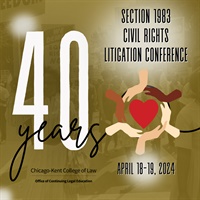40th Annual Section 1983 Civil Rights Litigation Conference
- Categories:
- Constitutional Law | Civil Rights
- Speakers:
- Sheldon H. Nahmod | Gerald M. Birnberg | Karen M. Blum | Erwin Chemerinsky | Raff Donelson | Rosalie Levinson | Noah Smith-Drelich
- Duration:
- 31 Hours 30 Minutes
- Product Type:
- Live Event
- Location:
- Chicago-Kent College of Law - Chicago, Illinois
Description
Section 1983 litigation continues to present challenges for federal and state courts across the country, and the Supreme Court has an especially large impact in this dynamic area of law. Join us for the 40th-year celebration of our annual two-day in-person conference to get up-to-date on the latest cases, trends, and strategies affecting §1983 litigation. You will have the opportunity to examine both the law of §1983 as well as the litigation strategies that underlie successful cases. As always, experts in the field address the most important issues and provide advice for you as you tackle this year’s cases, whether you represent plaintiffs or defendants. Topics covered this year include the §1983 claim, individual immunities, municipal liability, remedies, attorney's fees, substantive due process, the Religion Clauses, the Fourth Amendment, and the Supreme Court's Term.
This conference is in-person ONLY and will not be live-streamed. On-demand video will be available 14-28 days after the conference.
The conference will be held in the Oglivie Auditorium on the first floor.
CONFERENCE HOTEL ACCOMMODATIONS
Crowne Plaza Chicago West Loop
25 South Halsted Street, Chicago, IL 60661
Price $199/night
ADDITIONAL HOTEL ACCOMMODATIONS
Homewood Suites by Hilton West Loop
118 N Jefferson, Chicago, IL 60661
Club Quarters Hotel, Central Loop
111 West Adams Street, Next to the Rookery and near LaSalle, Chicago, Illinois 60603
Phone: (312) 214-6400
Speaker
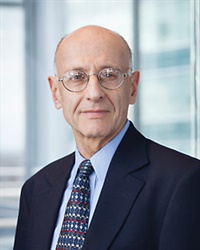
Sheldon H. Nahmod Related Seminars and Products
University Distinguished Professor of Law Emeritus (Program Chair)
Chicago-Kent College of Law
Sheldon H. Nahmod is a well-known expert on constitutional law, the First Amendment, civil rights and liberties and the law of Section 1983. He is the author of the three-volume Civil Rights and Civil Liberties Litigation: The Law of Section 1983 (2025-26)(West/Westlaw); A Section 1983 Civil Rights Anthology (1993); a casebook, Constitutional Torts (6th ed. 2025, with Wells, Smith and Smith-Drelich); and numerous law review articles. He has written many certiorari petitions and amicus briefs in the Supreme Court. He has also successfully argued civil rights cases in the Supreme Court and the First, Seventh, Eighth and Tenth Circuits, and consults nationally with attorneys (plaintiff and defense) on civil rights, civil liberties and constitutional law issues. In addition, he has lectured on civil rights and civil liberties matters to federal judges and attorneys throughout the country, including founding, organizing and speaking at Chicago-Kent's own annual Conference on Section 1983 for over 40 years. He lectures to lay groups on constitutional law and the First Amendment, most recently on the Religion Clauses.
Professor Nahmod graduated from the University of Chicago, Harvard Law School and the University of Chicago Divinity School (1996). He practiced with a corporate law firm in Chicago and was a legal services staff attorney before entering academia. He also was a teaching fellow at Harvard Law School, where he earned an LL.M. After joining Chicago-Kent, he served as associate dean for three years. He was named IIT University Distinguished Professor in 1992.
Over the years he has won awards for his teaching, including the Brill Award from the Student Bar Association. In 2001, he received the Jefferson Fordham Lifetime Achievement Award for his work in Section 1983 jurisprudence from the American Bar Association's Section on State and Local Government Law. In 2018, he received the Abner Mikva Award from the Chicago Chapter of the American Constitution Society for his contributions to civil rights and civil liberties. Also in 2018, he was named University Distinguished Professor Emeritus.
Professor Nahmod blogs on Section 1983, constitutional law, the First Amendment and other law-related topics at nahmodlaw.com.

Gerald M. Birnberg Related Seminars and Products
Adjunct Professor of Law
South Texas College of Law Office - Houston
Gerald M. Birnberg is a 50+-year lawyer whose practice has been focused on civil rights litigation, primarily on the plaintiff’s side. He is an adjunct professor of law at South Texas College of Law-Houston, where he courses in First Amendment Law and Recent United States Supreme Court Cases.
In private practice, Mr. Birnberg was the founding partner of Williams, Birnberg & Andersen, LLP in Houston, Texas, and is currently a solo practitioner (Law Office of Gerald M. Birnberg). He is certified as a specialist in civil appellate law by the Texas Board of Legal Specialization and a life fellow of the College of the State Bar of Texas.
Upon completing law school at the University of Texas in 1971, Mr. Birnberg served as a law clerk to the chief judge of the United States Court of Appeals for the Fifth Circuit. He has been in private practice since that time, concentrating on complex litigation, civil rights matters, and appeals. Mr. Birnberg has appeared before the Supreme Court of the United States (either on the briefs or in oral argument) on several occasions, including arguing Farrar v. Hobby, 506 U.S. 103 (1992) and Hill v. Printing Industries of the Gulf Coast, 422 U.S. 937 (1975). He is admitted to practice before seven federal circuits, and has been involved in more than 100 appellate cases.
From 2003 to 2012, Mr. Birnberg was Chair of the Democratic Party of Harris County, Texas. He also served on Houston Mayor Sylvester Turner’s Task Force on Policing Reform and is a member the Houston Independent Police Oversight Board.
A frequent lecturer, Mr. Birnberg has made numerous presentations to state and local bar seminars and published articles on First Amendment issues, attorney’s fees in civil rights cases, and numerous other topics. He also testified before the Committee on Education and Labor of the United States House of Representatives concerning the attorney’s fees provisions of the Civil Rights Act of 1990.
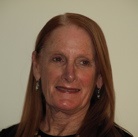
Karen M. Blum Related Seminars and Products
Professor Emerita and Research Professor of Law
Suffolk University Law School
Karen Blum is a Professor Emerita and Research Professor of Law at Suffolk University Law School where she taught for over forty years in the areas of Civil Procedure, Federal Courts, and Police Misconduct Litigation. Professor Blum has been a regular faculty participant in Section 1983 Civil Rights Programs and Institutes throughout the United States. Since 1990, she has served as a faculty member for workshops sponsored by the Federal Judicial Center for Federal District Court and Federal Magistrate Judges. She is a co-author of the treatise Police Misconduct: Law and Litigation and is an Advisor to the ALI Project on Restatement of the Law, Constitutional Torts.
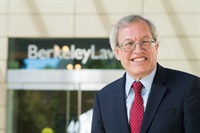
Erwin Chemerinsky Related Seminars and Products
Dean and Jesse H. Choper Distinguished Professor of Law
University of California, Berkeley School of Law
Dean and Jesse H. Choper Distinguished Professor of Law, University of California, Berkeley School of Law. Author of 22 books, including leading casebooks and treatises on Constitutional Law, Federal Jurisdiction, and Criminal Procedure, and over 200 law review articles. Frequently argues appellate cases, including in the United States Supreme Court.

Raff Donelson Related Seminars and Products
Associate Professor of Law
Chicago-Kent College of Law
Professor Donelson is an interdisciplinary scholar, whose research grapples with questions in law, in philosophy, and at the intersection of these two fields. In philosophy, his research focuses on the foundations of ethics and on questions about the nature of law. His legal doctrinal work centers on constitutional protections for incarcerated persons and the accused. He teaches courses in criminal law, criminal procedure, constitutional law, and legal theory. Professor Donelson was recently appointed as an editor at the Journal of Legal Philosophy.
Before joining Chicago-Kent, Donelson held an appointment at Penn State Dickinson Law and prior to that, he held a joint-appointment with the Paul M. Hebert Law Center and the Department of Philosophy at Louisiana State University. Donelson earned a doctoral degree in philosophy as well as a juris doctor from Northwestern University, a master’s degree in humanities from the University of Chicago, and a bachelor’s degree in philosophy and political science from Williams College.
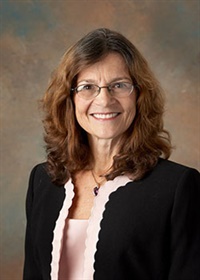
Rosalie Levinson Related Seminars and Products
Emeritus Professor of Law
Valparaiso University School of Law
Rosalie Levinson was the Phyllis and Richard Duesenberg Professor of Law and a Senior Research Professor at Valparaiso Law School, where, for 43 years, she taught constitutional law, civil rights litigation, and federal practices.
She previously worked as a staff attorney for a public interest organization and has been involved in substantial litigation. She has argued several civil rights cases before the 7th Circuit Court of Appeals and has been a frequent lecturer for continuing legal education programs, including those sponsored by the Federal Judicial Center for Federal Judges and the Practice Law Institute. In addition, she has team taught with Justices Scalia, Ginsburg and Thomas in conjunction with Valparaiso University School of Law’s summer program in Cambridge, England.
Professor Levinson received her J.D. at Valparaiso University School of Law (1973), her M.A. at Indiana University (Woodrow Wilson Fellow) (1970), and her B.A. at Indiana University (Phi Beta Kappa) (1969).
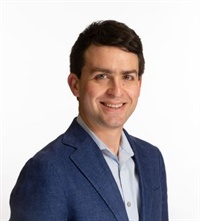
Noah Smith-Drelich Related Seminars and Products
Assistant Professor of Law
Chicago Kent College of Law
Noah Smith-Drelich is an assistant professor of law at the Chicago-Kent College of Law. His scholarship seeks to better understand the incentive structures underlying tort law, with a current focus on constitutional torts. Smith-Drelich also writes on the constitutional right to travel. His articles have been published or are forthcoming in the Ohio State Law Journal, Florida Tax Review, Southern California Law Review (twice), Indiana Law Journal, Public Health Nutrition, and Loyola of Los Angeles Law Review, as well as the California Law Review Online and Texas Law Review Online.
In addition to his academic research, Smith-Drelich maintains an active pro bono practice in civil rights and civil liberties impact litigation with a focus on indigenous rights and environmental justice. Currently, Smith-Drelich is the originating attorney and lead counsel on Thunderhawk v. County of Morton, a putative class action lawsuit challenging police abuses related to the Standing Rock-led resistance to the Dakota Access Pipeline. The case is in discovery against two defendants. The remaining defendants filed an interlocutory appeal of the district court's denial of their motions to dismiss, which Smith-Drelich argued in the Eighth Circuit Court of Appeals in February 2022.
Before joining the legal academy, Smith-Drelich worked as a staff attorney for the American Civil Liberties Union’s North Dakota, South Dakota, and Wyoming affiliate, and as an attorney at the litigation boutique Korein Tillery. He is a graduate of Stanford Law School, where he was an articles editor on the Stanford Law Review and the editor-in-chief of the Stanford Law & Policy Review.
Location
Chicago-Kent College of Law
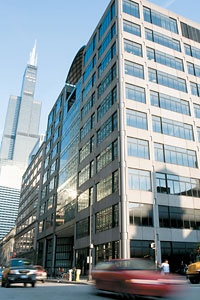
Agenda
-
Date/Time: Thu, Apr 18, 2024 - 08:45 AM to 09:00 AM (CDT)
Location: Ogilvie Auditorium, 1st Floor
-
Date/Time: Thu, Apr 18, 2024 - 09:00 AM to 10:15 AM (CDT)
Speaker(s): Sheldon H. Nahmod
Location: Ogilvie Auditorium, 1st Floor
-
Date/Time: Thu, Apr 18, 2024 - 10:15 AM to 10:30 AM (CDT)
-
Date/Time: Thu, Apr 18, 2024 - 10:30 AM to 11:45 AM (CDT)
Speaker(s): Karen M. Blum
Location: Ogilvie Auditorium, 1st Floor
-
Date/Time: Thu, Apr 18, 2024 - 11:45 AM to 01:00 PM (CDT)
-
Date/Time: Thu, Apr 18, 2024 - 01:00 PM to 02:00 PM (CDT)
Speaker(s): Raff Donelson
-
Date/Time: Thu, Apr 18, 2024 - 02:00 PM to 03:15 PM (CDT)
Speaker(s): Rosalie Levinson
Location: Ogilvie Auditorium, 1st Floor
-
Date/Time: Thu, Apr 18, 2024 - 03:15 PM to 03:30 PM (CDT)
-
Date/Time: Thu, Apr 18, 2024 - 03:30 PM to 04:45 PM (CDT)
Speaker(s): Gerald M. Birnberg
-
Date/Time: Thu, Apr 18, 2024 - 04:45 PM to 05:45 PM (CDT)
Location: Lobby
-
Section 1983 Remedies: Damages and Prospective Relief
Date/Time: Fri, Apr 19, 2024 - 09:00 AM to 10:15 AM (CDT)
Speaker(s): Noah Smith-Drelich
Location: Ogilvie Auditorium, 1st Floor
-
Break
Date/Time: Fri, Apr 19, 2024 - 10:15 AM to 10:30 AM (CDT)
-
Individual Immunities
Date/Time: Fri, Apr 19, 2024 - 10:30 AM to 11:45 AM (CDT)
Speaker(s): Erwin Chemerinsky
Location: Ogilvie Auditorium, 1st Floor
-
Lunch (on your own)
Date/Time: Fri, Apr 19, 2024 - 11:45 AM to 01:00 PM (CDT)
-
The Religion Clauses and Section 1983
Date/Time: Fri, Apr 19, 2024 - 01:00 PM to 02:15 PM (CDT)
Speaker(s): Sheldon H. Nahmod
Location: Ogilvie Auditorium, 1st Floor
-
The Supreme Court’s Current and Forthcoming Terms
Date/Time: Fri, Apr 19, 2024 - 02:15 PM to 03:30 PM (CDT)
Speaker(s): Erwin Chemerinsky
Location: Ogilvie Auditorium, 1st Floor


